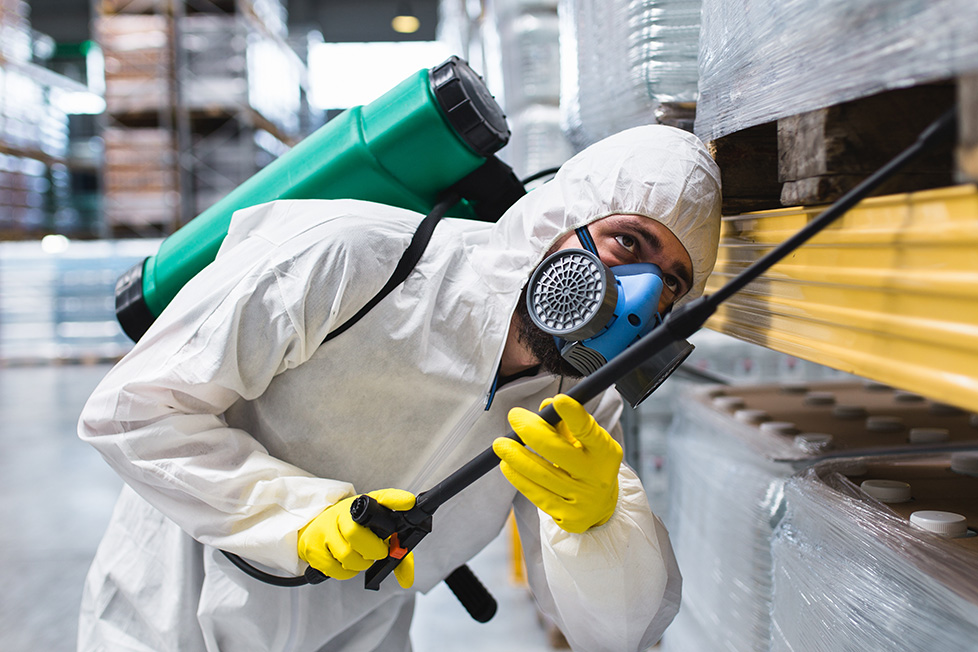Top-Rated Pest Control Homestead Companies for Your Satisfaction
Wiki Article
Discover the Keys of Pest Control: Just How It Functions and Process Revealed
Bug control is a careful technique that involves a deep understanding of bug behavior, tactical planning, and exact execution. From determining the origin creates of infestations to applying tailored control procedures, the process of insect control is a mix of scientific research and strategy aimed at preserving a harmonious atmosphere.Pest Behavior Comprehending
Recognizing the intricate behaviors of insects is vital for effective insect control administration. By delving right into the routines and patterns of different bugs, specialists can create targeted approaches to get rid of infestations and protect against future events. The actions of roaches, such as their choice for humid and dark environments, guides pest control experts in establishing where to concentrate therapy efforts. Recognizing that rodents are nighttime creatures assists in setting up traps and lures throughout the most energetic hours. Additionally, understanding the reproductive cycles of parasites like ants aids in interrupting their nests' development.By remaining abreast of the newest research study on bug actions, pest control experts can continuously improve their strategies and stay ahead of evolving insect populations. Eventually, a deep understanding of bug behavior is a foundation of successful bug control monitoring.

Assessment and Identification Methods
Effective bug control administration depends greatly on precise inspection and specific identification approaches to properly assess infestations and develop targeted obliteration strategies. Evaluation involves a detailed examination of the home to figure out the degree of the insect issue, determine the kind of insect present, and locate possible access factors. This procedure may include visually inspecting usual hiding places, utilizing tracking tools such as cameras or catches, and assessing pest droppings or damages signs.Identification is an important step that follows examination, as various bugs need particular treatment methods. Parasite control specialists use their expertise and expertise of pest behavior to determine the species existing properly. This might entail analyzing physical attributes, such as size, shade, and markings, as well as studying the parasite's habits and environments. Sometimes, samples may be accumulated for further analysis in a laboratory to verify the parasite types.
Insect Control Actions Implementation
Having meticulously inspected and accurately determined the insects existing, the following essential step is the implementation of targeted bug control procedures to successfully eliminate the invasion. Chemical therapies involve the usage of chemicals to eliminate pests, while organic controls present natural killers to handle insect populaces.Correct application of insect control measures calls for experience to guarantee the safety of inhabitants and the atmosphere. It is essential to follow standards and guidelines when applying chemicals and to use appropriate safety equipment. Monitoring and follow-up examinations are important to examine the effectiveness of the chosen methods and make any essential modifications. By utilizing targeted pest control procedures, problems can be efficiently eradicated, developing a healthier and pest-free setting.
Ecological Influence Considerations
When executing insect control procedures,Cautious evaluation of the prospective environmental effect is a vital element. Parasite control approaches can have numerous results on the setting, consisting of non-target species being influenced, contamination of soil and water resources, and interruption of the ecological community. It is vital to consider these variables to decrease any kind of adverse effects on the setting.To alleviate environmental impacts, integrated parasite monitoring (IPM) approaches are usually advised. IPM concentrates on utilizing a combination of techniques such as organic control, habitat manipulation, and the targeted use chemicals as a last hope. Pest Web Site Control Homestead. By utilizing an alternative technique, IPM aims to control pests properly while decreasing damage to the environment

Ongoing Surveillance and Prevention
Continual monitoring and avoidance play pivotal functions in keeping effective bug control techniques with time. Once preliminary pest control procedures have actually been executed, recurring monitoring becomes necessary to track insect task degrees and ensure that the selected techniques are functioning effectively. Routine inspections by qualified specialists permit the early detection of any type of indicators of pest renewal, making it possible for swift action to be taken before the infestation escalates.
Safety nets are just as essential in sustaining a pest-free setting. Carrying out techniques such as securing access factors, maintaining cleanliness, proper waste management, and minimizing resources of food and water deny parasites of the basics they require to grow. By proactively addressing these factors, the possibility of a bug invasion is substantially lowered.
In addition, preventative actions add to the lasting success of bug control efforts, reducing the need for reactive treatments and associated prices. By including recurring surveillance and avoidance into a detailed bug administration plan, individuals and businesses can effectively safeguard their residential properties versus undesirable intruders.
Conclusion
In conclusion, parasite control involves understanding bug actions, conducting extensive evaluations, executing control steps, considering ecological impacts, and keeping continuous monitoring and avoidance. By following these actions, insect problems can be successfully managed and regulated. It is vital to take a proactive strategy to pest control to safeguard both human wellness and the atmosphere.By remaining abreast of the most current research on bug behavior, bug control professionals can consistently fine-tune their techniques and stay in advance of advancing parasite populaces.Having carefully evaluated and precisely identified the bugs present, the following vital action is the execution of targeted bug control measures to efficiently get rid of the invasion.In addition, selecting environmentally friendly pest control products and methods can dramatically reduce the environmental impact of insect monitoring methods click for info - Pest Control Homestead. Visit This Link When first pest control steps have been implemented, continuous monitoring ends up being vital to track pest task levels and guarantee that the chosen techniques are working effectively.In verdict, parasite control involves understanding bug behavior, carrying out thorough assessments, implementing control measures, considering ecological effects, and preserving continuous tracking and prevention
Report this wiki page